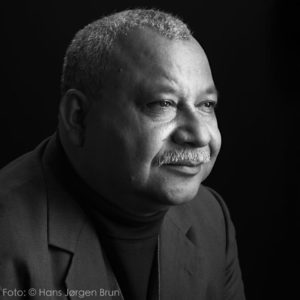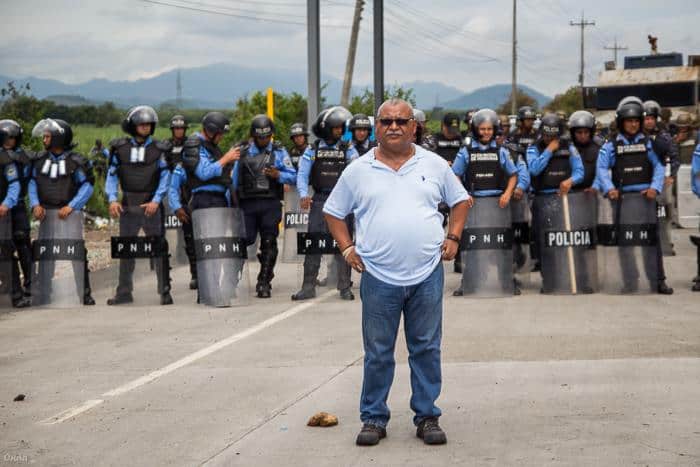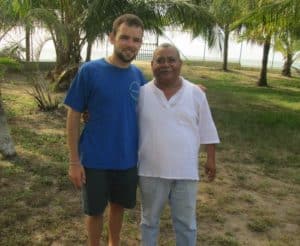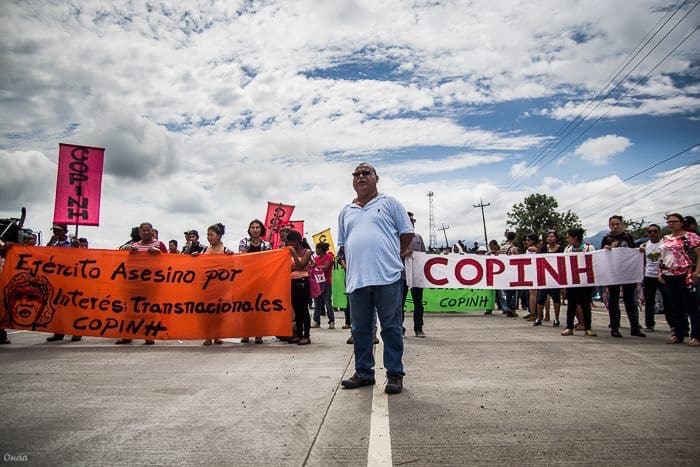Latin American Jesuits are raising the alarm about threats against human rights defenders in Honduras, including attacks aimed at discrediting the work and threatening the life of Father Ismael Moreno, SJ.
Moreno – affectionately known by all as “Padre Melo” – is director of the Honduran Jesuit radio station, Radio Progreso, and the Honduran Jesuit social action and analysis center, the Reflection, Investigation and Communication Team (ERIC). He is recognized internationally for promoting human rights in a country characterized by its weak institutions, official corruption and an extremely high murder rate. The broadcast station Radio Progreso reaches many rural communities, as well as the country’s largest cities. It serves as an important independent voice in a country where powerful interests control most broadcast media. And Padre Melo is a particularly coherent independent critical voice, one that Honduras very much needs.
Padre Melo has recently been attacked for his efforts to promote dialogue and advocated for those most marginalized in Honduran society. During student strikes last year at the national university, Universidad Nacional Autónoma de Honduras (UNAH), Padre Melo sat at the negotiating table at the request of the students, who felt he would listen to them and be a voice of reason. While agreements were reached between both parties and the overall prognosis appeared to be positive, that optimism did not last long. This year student strikes and protests returned to the UNAH, protesting the continuing stigmatization and criminalization of students by university authorities.
Retaliation was swift: 19 university students were arrested and suspended for five years, accused of occupying and damaging one of the university buildings, and three university students were found guilty this past June for occupying university property during demonstrations in July 2015. These punitive actions have garnered international attention at the highest level: the Office of the UN High Commission for Human Rights in Honduras (OACNUDH) expressed serious concern about the conviction of the three students in July 2015, and emphasized that these unjust judicial actions are being applied widely in Honduras: “in penal processes initiated particularly against human rights defenders, indigenous communities, Garifunas and peasants, encouraging their criminalization and indictment.”
Additionally, the university has brought in police forces and contracted private security forces to remove students from the buildings, which have resulted in injuries and building damages. Recent murders have also drawn concern for the physical safety of those exercising their right to peaceful protest. On July 23, the father of student Andrés Gómez, one of the 19 arrested, was murdered after supporting the demonstrations and attending the judicial hearing of his son. On July 11, a student active in the student movement was murdered.

Father Ismael Moreno, S.J.
Padre Melo has responded to all of this by re-doubling his efforts to promote dialogue, vocalizing the need for the inclusion of all perspectives at the table, especially the university students, who should be treated as the important dialogue partners in the reconciliation process that they are.
Despite his role as reconciler, Padre Melo has been attacked by the UNAH for “instigating” recent violence. In the midst of protests this past July, the UNAH rector, Julieta Castellanos, accused Padre Melo of “agitating” the student movement, and of “promoting practices and behaviors that… generate violence among the university students.” The UNAH has also terminated its academic agreement with the Jesuit center for social action, analysis and human rights, ERIC. These moves came after Padre Melo accompanied the Venezuelan group “Guaraguao” to a concert hosted on the university campus at the students’ request.
***
This public attack against Padre Melo by the UNAH rector is both a threat to an independent information source and a threat to his life and the lives of those he works with. It is embedded in a larger narrative that makes any dissenting voice the “enemy.” Individuals and organizations in Honduras supporting marginalized and oppressed communities and peoples are themselves being subject to a similar form of stigmatization and criminalization. Those who advocate for justice, for the defense of the rights of the marginalized and excluded, are being discredited, criminalized and assassinated throughout Honduras.
The concern for human rights defenders and all of those who are considered in the “opposition” or “threats” to the political-military-business establishment that maintains power in Honduras is not only the risks involved for these individuals and organizations, but also the limiting of these spaces of public debate, dialogue and critical thinking, all of which are key to a democratic society. At a celebration of the 60th Anniversary of Radio Progreso this past December, for instance, Emilio Álvarez Icasa, former Executive Secretary of the Inter-American Commission on Human Rights, argued that the spaces available to criticize and denounce the government in Honduras have become fewer. To the extent that these spaces are limited, so too is democracy truncated.
Padre Melo has expressed concern for the treatment of human rights defenders, environmentalists, journalists, student movements, all those who comprise the “opposition” to the dominant forces who are unable to control these groups. Those forces, he argues, engage in the stigmatization and criminalization of those participating in social protest and the human rights and environmental groups advocating for the defense of human rights and natural resources. In a recent article that quoted Padre Melo, he states that there is a four-stage progression to that process: first, these individuals and organizations are ignored; second, they are stigmatized; third, they are criminalized; and lastly, they are assassinated.
Given this reality, the UNAH rector’s accusations are extremely alarming. Powerful sectors of Honduran society that feel threatened by the work of Radio Progreso and ERIC can use Sra. Julieta’s words and accusations to defame and de-legitimize these institutions. In a country where violence and impunity reign, the rector’s insistence that Padre Melo is disrespectful of authority and promoting chaos and anarchy can only be viewed ominously. Her words, Padre Melo shows us, are part of a process to ignore, discredit, criminalize, and kill all opposition.
***
There has been an escalation of risks and threats not only against Padre Melo, but also the team of ERIC and Radio Progreso who receive, along with Padre Melo, protective measures from the Inter-American Commission on Human Rights. In the last several years, two employees of ERIC-Radio Progreso have been murdered – Carlos Mejía in 2014 and Nery Jeremías Orellada in 2011 – and threats have been made against 16 employees since the 2009 government coup. In late March 2017, a defamation campaign targeted Padre Melo, Salvador Zúniga, a distinguished indigenous leader, and members of the Civic Council for Popular and Indigenous Organizations in Honduras (COPINH) – whose founder, Berta Cáceres, was killed last year. The campaign tried to discredit Padre Melo and these other individuals and organizations, accusing them of having ties with money laundering and narco-trafficking. Human rights defenders and indigenous organizations registered concern for the further victimization of human and environmental rights groups through this defamation campaign, aimed at weakening, stigmatizing and even criminalizing these individuals and organizations. Radio Progreso-ERIC argued that this defamation campaign was being used as a façade to conceal and divert attention away from what was happening simultaneously in New York, where the testimony of the brothers who operated the Cachiros, a Honduran narco-trafficking organization, was implicating some government officials and business leaders in Honduras.

Padre Melo at a protest
The human rights, media communication, social analysis and accompaniment work that they undertake put them at greater risk of stigmatization, discrediting and even death. And this occurs in a context characterized by weak and corrupt Honduran institutions, impunity and unsolved murder cases, and the lack of protection for human rights defenders, environmentalists and journalists. Honduras continues to be the most dangerous country for environmental activists (based on the number of assassinations per capita) with 127 activists killed since 2007, 14 of them killed in last year alone, including international known Berta Cáceres, according to Global Witness.
On July 29, a day after the UNAH rescinded the agreement with ERIC with the public accusations by Sra. Julieta, Padre Melo published this on his Facebook account:
We will continue to cry out for a culture of peace. Speaking for myself and for my team at ERIC and Radio Progreso, we remain fully open to dialogue and to search for rational solutions no matter how adverse the context. And even though the path seems closed, there is no other way because the accusations which are so direct and threatening on the part of Sra. Julieta, have left us exposed and much more vulnerable to the immense powers that are behind her. What my team and I, in particular, can expect is physical aggression on the part of criminal forces, to be forcibly disappeared, to continue to be discredited and stigmatized in many ways, or at the very least to be sued and sentenced and end up in the Pozo prison. We will continue to be promoters of peace, education and full civic participation in freedom and democracy and the rule of law.
In a statement released on the Feast of St. Ignatius of Loyola, July 31, the Central American Jesuits, with support from the Conference of Provincials for Latin America and the Caribbean of the Society of Jesus, expressed the following:
We want to declare that the attacks directed against Fr. Melo are the consequence of working to defend the human rights of all sectors of society and of accepting to be mediators for “reconciling the estranged,” … The defense of human rights of the most excluded populations is the horizon that guides the work of the Society of Jesus in Honduras. Fr. Ismael Moreno and the team of ERIC-Radio Progreso are a model and valiant example of the Mission of the Society of Jesus that was reaffirmed in the 36th General Congregation, where it defines its central Mission as the reconciliation of humankind, as a single expression of the reconciliation with God, with people and with creation (GC 36, Decree 1, Life and Mission).
We are certain that none of these attacks will be able to undermine the firm integrity of the efforts of ERIC-Radio Progreso, of the members of its team and of its director, Fr. Ismael Moreno. Their search for “solutions which are fully human” for all the people of the Republic of Honduras, and especially for those people who we should care for most as Christians and as Jesuit companions of Fr. Melo, which is to say for the poor and oppressed to whom we must give preferential option, as preached by Jesus of Nazareth, the Christ, our one Lord. For these reasons we support, reaffirm and admire the labor of Fr. Ismael Moreno and the entire team of ERIC-Radio Progreso.”
Along with the Latin American Jesuits, there has been an outpour of support of and solidarity with Padre Melo and the team at ERIC and Radio Progreso from individuals and organizations from across the country, voicing their deep concern for the recent attacks against Padre Melo. Concern has also been raised internationally from solidarity groups, human rights groups and most recently US Congresswoman Marcy Kaptur, who issued a statement expressing concern about the increase of risk for human rights defenders in Honduras, explicitly mentioning Padre Melo and the entire team of Radio Progreso and ERIC.
***

The author with Padre Melo
This story has a personal dimension for me. Padre Melo has been my mentor, someone I have looked up to ever since I met him prior to entering the Jesuits.
Last year I was at a conference with Melo. A month earlier his dear friend and fellow promoter of justice and peace in Honduras, Berta Cáceres, had been brutally killed in her home. He gave me an affectionate huge, saying “querido compañero,” resting his head on my shoulder. He was the compassionate, cariñoso, affective compañero and brother all who know him love.
In the midst of the violence and despair symbolized by Berta’s death, I had to ask Melo: how do you all do what you do? “It’s the hope we have facing whatever problem,” he answered. No one can take that hope away from Padre Melo, however challenging and dangerous his work.
When he received the Rafto Prize, Melo, echoing the vision that animates Radio Progreso and ERIC, said, “I believe profoundly in life, and I profoundly believe in human beings and I deeply believe that the good will prevail against any kind of evil and violence. Because of this I am happy to share my life and my work in the world.”


